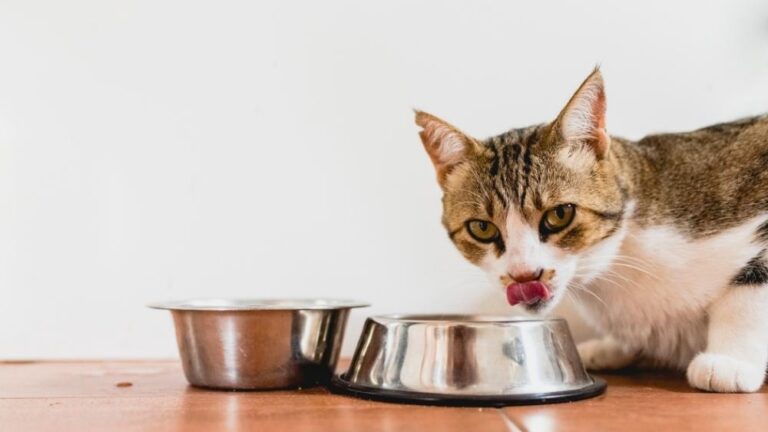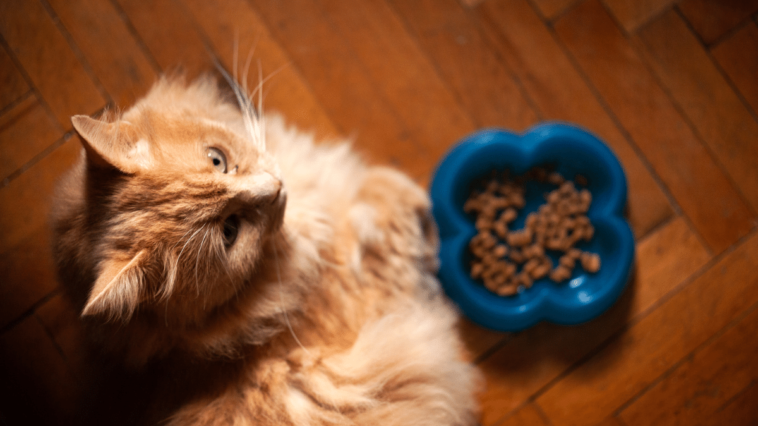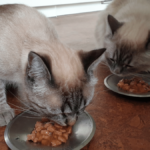As cat owners, it is important to understand the dietary needs of our feline companions. A common question arises: How long can a cat go without eating?
While cats are known for their ability to go without food for short periods, prolonged fasting can be dangerous and may indicate underlying health issues.
In this article, we will explore the factors that affect a cat’s ability to go without food, the risks of prolonged fasting, and what to do if your cat refuses to eat. Understanding these key factors can help you provide the best care for your cat and ensure their health and well-being.
How Long Can A Cat Go Without Eating Food or Water
Cats require a balanced diet of protein, fat, carbohydrates, and essential vitamins and minerals to maintain their health and well-being. If a cat goes without food for an extended period, their body will begin to break down fat energy stores, leading to the risk of serious health problems.
As mentioned earlier, healthy adult cats can technically go without food for up to five days. However, it’s important to remember that this timeline can vary depending on several factors, including the cat’s age, overall health, and weight.
Dehydration is a serious concern for cats, as their bodies comprise 60% to 70% water. When a cat goes without water for an extended period, their body will begin to conserve water by producing less urine. This can lead to a buildup of waste products in the bloodstream, causing various health problems, including kidney damage and failure.
It’s important to note that the length of time a cat can go without water also varies depending on several factors, including their age, overall health, and environment. Cats exposed to hot and dry environments or with underlying medical conditions may quickly become dehydrated and require immediate veterinary attention.
How Long Can A Cat Go Without Eating Anything

Cats can go without food for up to five days before the body begins to break down fat energy stores. However, prolonged fasting can lead to several health problems, including hepatic lipidosis, muscle wasting, and a weakened immune system.
If a cat goes without food for an extended period, their body will begin to break down muscle tissue, leading to various health problems, including weakness and lethargy. In some cases, prolonged fasting can also lead to the development of hepatic lipidosis, a life-threatening liver condition that can occur when the liver becomes overwhelmed with fat.
If a cat stops eating, monitoring their overall health closely and seeking veterinary attention is important.
Sometimes, a cat may require medical intervention, such as appetite stimulants or tube feeding, to help them regain their appetite and start eating again.
It’s also important to note that cats without food for an extended period are at an increased risk of developing other health problems, including dehydration, urinary tract infections, and other illnesses. Therefore, it’s important to take prompt action if your cat stops eating to avoid potential health complications.
Understanding a Cat’s Nutritional Needs
Cats have unique nutritional needs that differ from dogs and other animals. As obligate carnivores, they require high animal-based protein to meet their nutritional needs. Protein provides cats with the essential amino acids to build and maintain strong muscles, organs, and tissues. In addition, cats require certain nutrients found primarily in animal-based proteins, such as taurine and arachidonic acid, which are critical for heart health, vision, and digestive health.
Cats also require moderate fat in their diet, as fat provides a concentrated energy source and is essential for absorbing certain vitamins. However, monitoring the amount of fat in a cat’s diet is important, as excessive amounts can lead to obesity and other health problems.
Carbohydrates are not essential for a cat’s diet, and their digestive system is not well-adapted to process them. Therefore, a high-carbohydrate diet can lead to digestive problems and other health issues in cats.
It is also important to ensure that cats consume enough water, as they are not naturally inclined to drink much water. Feeding wet food, adding water to dry food, and providing fresh water sources can help keep cats hydrated and avoid dehydration-related health problems.
The Risks of Prolonged Fasting for Cats
Prolonged fasting can be dangerous for cats and should be avoided. Cats are not adapted to tolerate long periods without food, as their liver cannot store large amounts of glucose. In addition, fasting can lead to hepatic lipidosis, also known as fatty liver disease, which can be life-threatening.
Hepatic lipidosis occurs when the liver breaks down fat stores due to insufficient glucose. This process can lead to excessive amounts of fat accumulation in the liver, impairing liver function and leading to organ failure if left untreated.
In addition, prolonged fasting can lead to other health problems, such as dehydration, electrolyte imbalances, and muscle wasting. These health issues can weaken a cat’s immune system and make them more susceptible to other illnesses.
It is important to monitor a cat’s food intake and seek veterinary care if they refuse to eat for more than 24 hours. Early intervention can help prevent serious health problems and ensure the cat receives the nutrients necessary to maintain health.
Reasons For Cats Not Eating Food
There can be various reasons why a cat may refuse to eat their food. Some common reasons include:
- Illness or pain: If a cat is experiencing pain or illness, it may lose its appetite. Dental issues, gastrointestinal problems, and infections can all cause a cat to refuse food.
- Changes in diet: Cats can be picky eaters and sudden changes in their diet can cause them to lose interest in their food. It is important to introduce new foods gradually to avoid upsetting a cat’s digestive system.
- Stress: Cats are sensitive to changes in their environment and routine, and stress can cause a loss of appetite. Moving to a new home, a new pet or person, or changes in the daily routine can all lead to stress.
- Aging: As cats age, their sense of smell and taste may diminish, making their food less appealing. In addition, older cats may have dental problems that make it difficult to chew their food.
- Feeding schedule: Some cats are used to being free-fed, meaning they have access to food all the time. However, switching to scheduled feedings may cause them to refuse their food if they are not used to the new routine.
If a cat refuses to eat their food for more than 24 hours, it is important to seek veterinary care. A veterinarian can help determine the underlying cause of the cat’s loss of appetite and provide treatment to address any health issues. In some cases, appetite stimulants or changes in diet may be necessary to encourage a cat to eat again.
What To Expect If Cat Doesn’t Eat
Serious consequences can occur if a cat doesn’t eat for an extended time. Here are some things you can expect if your cat stops eating:
- Weight loss: Without food, a cat will begin to lose weight. Depending on the length of time without eating, this can be a significant amount of weight.
- Dehydration: In addition to food, cats also need water to maintain their health. A cat can become dehydrated without water, leading to serious health complications.
- Metabolic changes: When a cat doesn’t eat, their body will break down fat energy stores. This can lead to metabolic changes and an accumulation of toxins in the body.
- Liver disease: Prolonged fasting can lead to a condition known as hepatic lipidosis or fatty liver disease. This serious condition can lead to liver failure and even death.
- Weakened immune system: Without proper nutrition, a cat’s immune system can become compromised, making them more susceptible to infections and other illnesses.
If your cat is not eating for more than 24 hours, it is important to seek veterinary care. A veterinarian can help determine the underlying cause of the loss of appetite and provide treatment to address any health issues. In some cases, appetite stimulants or changes in diet may be necessary to encourage a cat to eat again. Early intervention can help prevent serious health problems and ensure that your cat receives the necessary nutrients to maintain their health.
Cat Not Drinking Water
If your cat is not drinking water, it can be concerning as water is crucial to their overall health and well-being. Here are some reasons why a cat may not be drinking water and what you can do to encourage them to drink:
- Medical issues: Several medical conditions can cause a cat to avoid drinking water, including kidney disease, urinary tract infections, dental problems, and dehydration. If your cat is not drinking water, it is important to take them to the vet to rule out any underlying medical issues.
- Water source: Cats are known to be picky drinkers and may not like the taste or temperature of the water. Try providing fresh and clean water in a clean bowl, and consider using a water fountain, as some cats prefer running water.
- Location of water bowl: The location of the water bowl can also play a role in a cat’s willingness to drink. Try moving the bowl to a different location, away from their litter box or food bowl.
- Wet food: If your cat is not drinking water, try adding wet food to their diet. Wet food contains more water and can help keep your cat hydrated.
- Ice cubes: Some cats enjoy playing with ice cubes in their water bowl, which may encourage them to drink more.
If your cat is not drinking water for more than 24 hours, it is important to seek veterinary care immediately, as dehydration can lead to serious health complications. A veterinarian can help determine the underlying cause of the loss of thirst and provide treatment to address any health issues.
What To Do When Cat Refuse To Eat
If your cat is refusing to eat, there are a few things you can try to encourage them to eat again:
- Offer a variety of foods: Cats can be picky eaters, so offering a variety of foods can help stimulate their appetite. Try offering different flavors and textures of wet and dry food, treats, or cooked chicken or fish.
- Warm up the food: Warming up the food can help enhance the aroma, making it more appealing to a cat’s sense of smell.
- Offer food in small portions: Offering small portions frequently throughout the day can help encourage a cat to eat. It is important to avoid overfeeding, as this can lead to obesity.
- Try feeding in a quiet, stress-free environment: Some cats may be more likely to eat in a quiet, stress-free environment. Try feeding in a separate room away from other pets or distractions.
- Consult with a veterinarian: If your cat refuses food or has other signs of illness, it is important to seek veterinary care. A veterinarian can help determine the underlying cause of the loss of appetite and provide treatment to address any health issues.
In some cases, appetite stimulants or changes in diet may be necessary to encourage a cat to eat again. It is important to monitor your cat’s food intake and seek veterinary care if they are not eating for more than 24 hours. Early intervention can help prevent serious health problems and ensure your cat receives the nutrients necessary to maintain health.
Conclusion
Keep track of your cat’s food and water consumption regularly because any alterations could signify underlying health problems.
If your cat is not eating or drinking, seeking veterinary care to determine the cause and provide appropriate treatment is important. A balanced and nutritious diet that meets your cat’s nutritional needs is crucial to their overall health and well-being.
Encouraging your cat to drink water regularly and providing a clean and fresh water source can also help prevent dehydration and related health problems. With proper care and attention, you can ensure your cat remains healthy and happy for years.




